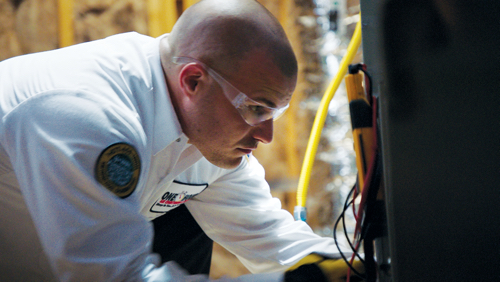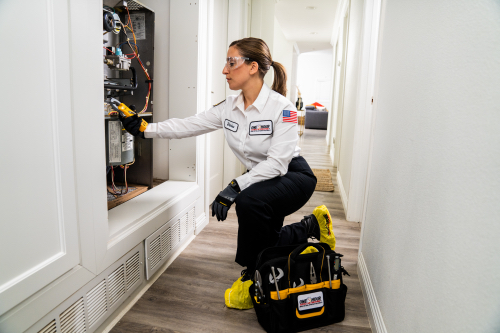The Best Time for Heat Pump Repairs
For many homeowners, a heat pump is the heart of their heating and cooling system. It works tirelessly through every season, ensuring that your home remains comfortable, whether sunny or snowy. But like any hardworking appliance, it’s bound to need repairs at some point.
The question is, when is the best time to schedule those repairs? Timing can make a world of difference in cost, convenience, and preventing bigger problems down the road
The Warning Signs: Your Heat Pump is Trying to Tell You Something
First things first, your heat pump isn’t shy about broadcasting when something’s wrong. Here are the red flags you absolutely cannot ignore:
Weird Noises That Make You Go “Hmm”
Clanging? Buzzing? Random sounds that make you wonder if something’s possessed? Those aren’t normal. Your heat pump is screaming for help.
Airflow That’s More of a Whisper
Remember when your heat pump used to blast air like a champ? If it’s now more of a gentle breeze, something’s up. Could be a clogged filter, leaky ducts, or your system showing its age.
Energy Bills Climbing Like a Mountain
Suddenly your electricity bill looks like it’s been hitting the gym. Your heat pump might be working overtime, and not in a good way.
The On-and-Off Dance
If your heat pump is constantly cycling on and off like it can’t make up its mind, that’s a problem. It could be a thermostat issue, a clogged filter, or a compressor throwing a tantrum.
Timing is Everything: The Best Time to Schedule Those Repairs
The Golden Window: Late Spring and Early Fall
Here’s a pro tip: HVAC technicians have their own “off-season,” and it’s magical. Late spring and early fall are when demand drops, which means:
- Shorter wait times
- More flexible scheduling
- Potentially lower prices
Don’t Play the Waiting Game
Procrastination is the enemy here. Noticed an issue? Get it checked. That tiny motor problem today could turn into a wallet-destroying nightmare tomorrow.
What NOT to Do: Peak Season Repairs
Trying to limp through summer or winter with a struggling heat pump? Bad idea. During peak seasons:
- HVAC companies are swamped
- Emergency repairs cost more
- You might be left without heating or cooling when you need it most
Maintenance vs. Repairs: Know the Difference
Think of maintenance like a regular doctor’s check-up. It keeps things running smoothly and catches issues early. Repairs? That’s like emergency surgery.
Why Maintenance Matters
- Catches small problems before they become big ones
- Extends your heat pump’s life
- Reduces unexpected breakdowns
Pro tip: Many HVAC companies offer maintenance plans. It’s like an insurance policy for your comfort.
Homeowner’s Repair Survival Kit
Plan Ahead
Don’t wait for a breakdown the best time to schedule is now before you find yourself in an emergency situation.
The Best Time
schedule repair service now so you don’t find yourself in an emergency situation.
Know Your Warranty
Check what’s covered. Sometimes you might get free parts or discounted repairs.
Budget for TLC
Set aside money for annual maintenance. Your future self will thank you.
Upgrade Considerations
If repairs are becoming a monthly ritual, it might be time to consider a new unit. Sometimes spending money saves money.
When to Call in the Pros
Listen, we all want to be DIY heroes. However, some heat pump issues require a professional touch. If you’re experiencing:
- Persistent strange noises
- Significant efficiency drops
- Multiple components failing
It’s time to call a technician.
Your Heat Pump’s Emergency First Aid Kit
Sometimes, you need to be your heat pump’s first responder. Here’s a quick guide to immediate actions you can take before the professionals arrive:
- Keep air filters clean and replace them regularly
- Check your thermostat batteries
- Ensure outdoor units are clear of debris, leaves, and vegetation
- Listen for unusual sounds and note when they occur
- Keep the area around your heat pump clear and accessible
- Have a digital thermometer handy to track your home’s temperature
- Keep your system’s manual in an easy-to-reach place
Think of this as a basic first aid kit for your heat pump. These simple steps can help diagnose problems quickly, provide valuable information to technicians, and potentially prevent minor issues from becoming major headaches. Plus, being prepared gives you peace of mind and helps you feel more in control when your heat pump starts acting up.
The Bottom Line
Your heat pump works hard really hard. It deserves some attention and care. By staying proactive, listening to its “signals,” and schedule timely maintenance, you can avoid those nightmare scenarios of complete system failure.
Remember, A small repair today can prevent a wallet-crushing replacement tomorrow. Pay attention, be proactive, and keep your home comfortable all year round.
